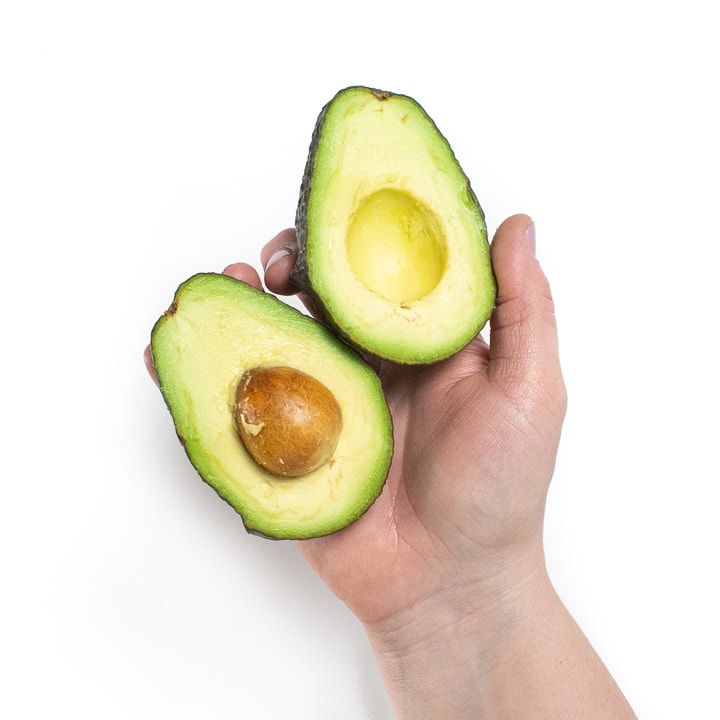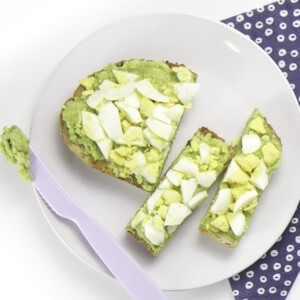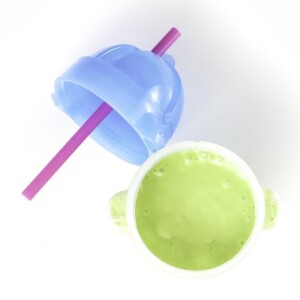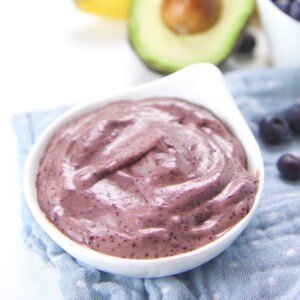Avocado Profile

Medically reviewed and cowritten by Jamie Johnson, Registered Dietitian Nutritionist (RDN).
Avocado for Baby
Avocados are often called one of nature’s perfect foods because they contain so many of the nutrients a person needs to survive and thrive. They are packed with all the B vitamins (minus B12), vitamin C, a wide array of minerals, and many brain-building omega-3 fatty acids. 88% of an avocado comprises healthy fat, helping us absorb certain fat-soluble vitamins, control blood sugar, and support a healthy cardiovascular system. Avocados provide our bodies with a lot of nutrient support, but they are also the perfect first food for your baby. Avocados are soft and don’t need to be cooked. They’re versatile and can be stirred or blended into just about any puree for some additional healthy fat content, and the taste is mild enough for even the pickiest of eaters!
HEALTH BENEFITS OF AVOCADO
There’s nothing better than cutting open a perfectly ripe avocado to see its flawless vibrant green flesh inside. But it’s hard to do because it seems these finicky little fruits are only perfect for a few hours or day at the most. It hurts my heart when I miss their peak and have to toss them since they are packed with nutrients!
- Avocados are full of healthy fats, making them a great food to support heart health.
- Very high in fiber to support healthy digestion and keep constipation at bay.
- A good source of vitamin C to support immunity and help absorb iron.
- High in vitamin E, an antioxidant that protects our bodies from free radicals and cancer.
Highlighted Nutritional Importance of Avocados
Vitamins
Vitamin C – this potent antioxidant is important for boosting the immune system, healing small cuts, and fighting off germs that cause infection.
Vitamin K – is vital for the blood clotting process and helps build a healthy skeletal system.
Pantothenic Acid – also known as vitamin B5, pantothenic acid is essential for the production of hormones and cholesterol and for the metabolism of carbohydrates, fats, and proteins.
Vitamin B6 – is needed to metabolize protein, fat, and carbohydrates and helps form a healthy brain.
Folate – this B vitamin helps to build a healthy brain and support a healthy nervous system.
Minerals
Potassium – this electrolyte mineral works with sodium to help keep your baby’s heart muscles working properly and efficiently.
Copper – this trace mineral is essential for forming red blood cells and boosts the body’s ability to mend tissues.
Magnesium – helps regulate energy production in the cell and is necessary for hormone production and healthy bones and teeth.
Manganese – a potent antioxidant that helps protect cells from damage
Phosphorus – this mineral is crucial for building healthy bones and teeth
How to Select and Store Avocados
Avocados they are one of the foods least contaminated with pesticides. Purchasing organic is a personal choice.
A ripe avocado is slightly soft but shouldn’t have any sunken spots or cracks indicating that it’s overly ripe. If you don’t have access to soft, ripe avocados, purchase the hard, unripened fruits and ripen them at home either in a paper bag or on the counter.
To prepare the avocado, cut it in half lengthwise, then remove the pit by either spearing it with your knife or scooping it out with a spoon. Be careful; avocado-related injuries are common while trying to remove the pit! After the pit is removed, you can either spoon out the flesh or peel the avocado. Peeling the avocado will ensure that the fruit contains most of that dark green outermost flesh that is nutrient-rich. If you don’t use the entire avocado at once, sprinkle the remaining portion with fresh lemon juice or vinegar to preserve the vibrant green color and store in an airtight container.
Avocados can be served many different ways, but they are perfect stirred into sweet or savory purees, cut into slices for a quick, healthy snack for baby or kiddo or even mashed into a zesty guacamole for older babies!





